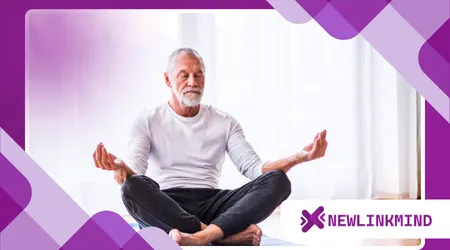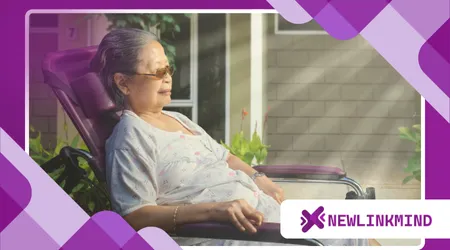Morning vs. Evening Meditation for Seniors: What Works Best?

advertisements
For many older adults, the question of morning vs. evening meditation for seniors isn’t merely about convenience; it’s about optimizing well-being.
Finding the ideal time to cultivate inner peace is a personal journey, and for seniors, daily rhythms often play a more pronounced role.
Let’s explore the nuances of both morning and evening practices, considering the unique benefits each offers.
The Allure of Morning Meditation for Seniors
Starting the day with meditation offers a powerful foundation.
It’s an opportunity to set a positive tone. Many seniors report increased focus and a sense of calm throughout their day. This practice can truly transform how one approaches daily tasks and interactions.
advertisements
Setting the Day’s Intention
Morning meditation provides a clean slate. You can consciously choose how you wish to experience the hours ahead.
It’s about more than just clearing your mind; it’s about actively shaping your day. This proactive approach can reduce stress.
A quiet morning mind is more receptive. Practicing mindfulness early sharpens cognitive functions.
advertisements
Seniors often find improved concentration after a morning session. This clarity can extend to everyday decision-making.
Read here: 5 Calming Mantras for Senior Meditation
Paradoxically, stillness can energize. Morning meditation awakens the mind gently. It can alleviate morning grogginess and lift spirits. Many people experience a noticeable mood elevation.
An Example of Morning Meditation’s Impact
Consider Evelyn, 78, who struggled with morning anxiety. She began a 15-minute guided meditation each day. Within weeks, her anxious thoughts diminished.
She felt more in control and less rushed. Evelyn now starts her day with a sense of hopeful anticipation.

The Serenity of Evening Meditation for Seniors
Shifting to the latter part of the day, evening meditation presents its own distinct advantages. It offers a chance to unwind.
This practice facilitates a peaceful transition from activity to rest. It truly prepares the body and mind for restorative sleep.
Read more: Restorative Yoga for Seniors: Deep Relaxation at Any Age
The day often accumulates stress and worries. Evening meditation provides a crucial release. It allows you to process and let go of lingering anxieties. This practice helps to clear the mental clutter.
One of the most significant benefits is improved sleep quality. A calm mind before bed encourages relaxation.
Many studies, including a 2018 review in JAMA Internal Medicine, have highlighted meditation’s positive impact on sleep disturbances. It can reduce the time it takes to fall asleep.
Evening offers a time for introspection. You can gently review the day’s events. This reflective practice can bring valuable insights. It helps consolidate learning and growth.
Take Robert, 82, who often lay awake pondering his to-do list. He started a 20-minute body scan meditation before bed.
Soon, he found himself drifting off peacefully. Robert now wakes feeling more rested and refreshed.
The Core Differences: Morning vs. Evening Meditation for Seniors
The fundamental distinction lies in purpose and outcome. Morning meditation acts as a proactive catalyst. It sets the stage for a productive and mindful day.
Evening meditation, conversely, serves as a reactive release. It prepares the mind and body for rest and recuperation.
Mornings generally find us more alert. This can make focused meditation easier. Evenings, however, might bring fatigue. This can sometimes hinder deep concentration.
Morning often offers quiet solitude. Household distractions might be minimal. Evenings can be busier for some. Family activities or evening routines might interfere.
Establishing a morning routine can be effective. It often aligns with existing daily structures. Evening practice might fit better for those with flexible schedules. Consistency is paramount regardless of time.
Making Your Choice: Finding Your Rhythm
Ultimately, the best time for morning vs. evening meditation for seniors depends on individual preferences and lifestyle.
There is no universally “correct” answer. Experimentation is key to discovering what resonates most deeply with you.
Listen to your body and mind. When do you feel most receptive to stillness?Are you a morning person, or do you thrive in the quiet of the evening?
Your inner wisdom will guide you.Consider your daily schedule. When do you have an uninterrupted window?
++ The Best Online Yoga Classes You Can Do from Home
Factor in family commitments and personal energy fluctuations. Flexibility in your approach is a strength.
Whether morning or evening, regularity is more important than duration.
Even five to ten minutes daily yields significant benefits. A consistent practice builds powerful momentum.

The Power of Both: A Hybrid Approach
Some seniors find a hybrid approach incredibly beneficial. A short morning session can set a positive tone. A brief evening practice can aid in winding down.
This dual strategy offers comprehensive support for well-being.
Imagine starting your day centered and ending it relaxed. This combination maximizes the advantages of both timings. It addresses both proactive mental preparation and restorative release.
Think of it like tending a garden. Morning meditation is like carefully planting seeds and preparing the soil, setting up the day for growth.
Evening meditation is like watering the plants and gently clearing away any weeds, ensuring they thrive and are ready for the next day. Both actions are crucial for a flourishing garden of well-being.
Key Considerations for Seniors
Meditation is a safe and accessible practice. However, a few points are especially relevant for older adults.
Ensure your meditation posture is comfortable. Use cushions, chairs, or blankets as needed. Physical ease allows for deeper mental relaxation.
Many seniors find guided meditations helpful. They provide structure and support. Numerous apps and online resources offer options.
Results may not be immediate. Be patient with yourself and your practice. Small, consistent efforts accumulate over time.
Statistical Insight
According to a 2023 survey by the National Council on Aging, approximately 38% of seniors in the United States reported engaging in some form of regular mindfulness or meditation practice.
Reflecting a growing awareness of its benefits within this demographic. This highlights the increasing adoption of these practices for improved well-being.
Frequently Asked Questions
Can I meditate lying down?
Yes, absolutely! Lying down is perfectly fine, especially if sitting is uncomfortable. The goal is relaxation, not a specific posture.
What if my mind wanders constantly?
Mind-wandering is normal. Gently bring your attention back to your breath or focus point. This act of returning is the practice itself.
How long should a senior meditate?
Start with short durations, like 5-10 minutes. Gradually increase if you feel comfortable. Even brief moments of stillness are beneficial.
Is meditation safe for seniors with health conditions?
Generally, yes. However, if you have specific health concerns, it’s always wise to consult your doctor before starting any new practice.
Are there specific types of meditation best for seniors?
Mindfulness meditation and loving-kindness meditation are often recommended. Body scan meditations are also excellent for relaxation and body awareness.
